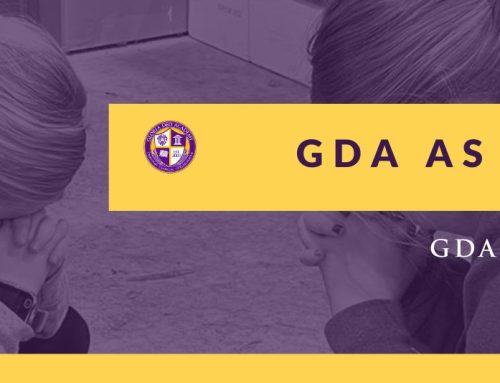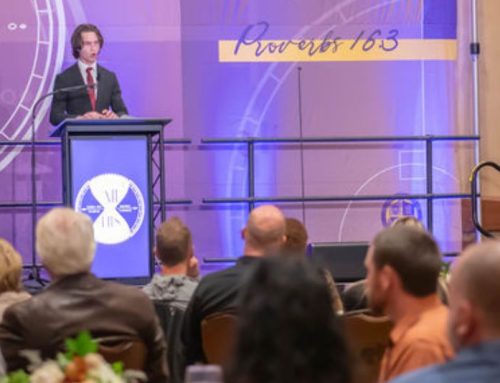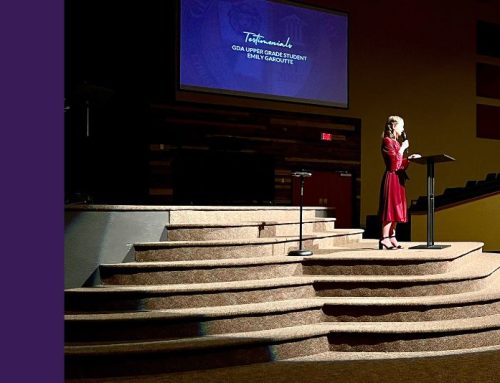Classical Education…..“By wisdom a house is built, and by understanding it is established; by knowledge the rooms are filled with all precious and pleasant riches.” -Proverbs 24:3-4
Core Values…Christian, Classical, Collaborative. How much do you know about the 3 C’s and especially the 2nd one, Classical? What is Classical Education?
We hear them often as part of the GDA family, and as teachers and students we repeat them daily in our mission statement. I am, of course, talking about the three C’s that make up our core values: Christian, classical, and collaborative. (Isn’t it great when alliteration works out so well?) I think it would be safe to say that most of us clearly understand the “Christian” and the “collaborative” parts of these three C’s. But how much do you really know about that second C, the “classical” part?
It’s my guess that this particular “C” may remain a mystery for many, even those who have attended GDA for some time. If your main idea of classical education is merely reading old books and learning an old language (Latin drills, anyone?) then keep reading, because you are missing out on understanding this fantastic second C! So here comes the inevitable question: what is classical education? I’ll be honest—this is where it can get a little tricky. There is so much to be said about “classical education” that it can be overwhelming to nail down a definition.
What is classical education?
You may read how it is a time-tested tradition of education that has developed the greatest leaders and thinkers of the past (think Aristotle, Plato, C.S. Lewis, and Thomas Jefferson). You will hear others emphasize it as being the pursuit of virtue, truth, beauty, and goodness (yes, we all want that for our kids). You will learn that Christian classical education puts God at the center of each subject, showing how all subjects are interrelated and point back to Him. And you will come to understand how classical education ultimately creates self-directed learners who are taught how to think and learn versus merely what to think or learn. This all culminates in the cultivation of wisdom as the final goal of classical education.
That all sounds amazing, right? But if you’re anything like me, all this information leaves you a little confused. It still sounds a bit too abstract. Personally, I need something more concrete to show me how this looks in practice. What does it look like to teach classically in the classroom and in our homes?
Stages of Learning through the Trivium
After all, if you don’t understand the method, then you will most likely find yourself asking, “Why are we doing this?” “Why is it relevant for my young child to know that?” “Do we really need to be reading that ?”
But as the saying goes (and as I say often in my home), “There’s a method to the madness!”
So what is that method? Simply put, the classical method is three stages of learning called the Trivium. You could say it is a 3-step process for training the mind. These stages are grammar, logic, and rhetoric. Interestingly, these three stages correspond with how kids are developmentally inclined to learn, as we’ll look at more closely below. I also find it fascinating that they ultimately embody knowledge (grammar), understanding (dialectic/logic), and wisdom (rhetoric), which is the natural progression of learning anything!
The Grammar Stage
The first step of this learning process is the grammar stage, which corresponds roughly to the elementary ages. (The term “grammar” just refers to the basic parts or vocabulary of any subject—not an endless English grammar lesson!) The purpose of this stage is the accumulation of facts and information. This is done through lots of memorization, as any GDA elementary student knows. This is the perfect time for all that memory work, when students’ minds are the most “spongy” and able to soak up tons of information! They love repetition, songs, rhymes, and the like, so we utilize these means as a way to memorize facts, terminology, definitions, lists, formulas, and more. Because I have the most experience with this super fun stage, I want to highlight something that will, hopefully, lift some anxiety off both parents and teachers: the goal here is primarily the exposure to and gathering of information, not understanding. This is an important distinction to make. Understanding will come when students are developmentally ready for it.
The Logic Stage
That brings us to the logic stage. This would mainly be our middle-school students, although this stage can begin earlier for some kids. This age group has a natural tendency to debate and question, and they are ready to dig deeper to figure out the “why” behind everything! Now that they have spent their grammar years storing up a base of information, they will use that to study topics and concepts in greater depth. This is an exciting time where connections are being made and students discover how facts relate. Discussion is a major component of this stage, as well as the study of formal logic, debate, and reasoning skills.
The Rhetoric Stage
The final phase of learning, into which our 9-12 students would fall, is the rhetoric stage. Rhetoric is all about communicating well. At this point, our students have stored up knowledge (grammar) and learned to think critically about those facts (logic). Now they are ready, as well as more naturally inclined, to express their thoughts and ideas through speeches, writing, and conversations. They are also more creative problem-solvers. These students use what has been learned to solve a problem, write an original speech, lead a discussion, or teach others what they know. This is what we have been waiting for, as we see the culmination of knowledge and understanding growing into wisdom!
Now we come back to all those wonderful goals of classical education, because this method of learning is exactly how our kids learn to learn; it is how they seek out truth, beauty, and goodness; it is how they become self-directed learners and leaders. And yes, that still involves studying the “old books” and learning Latin, plus so much more! But the key is the Trivium. Like the roots of a tree, a foundation of information is laid in the grammar stage as our children soak in knowledge. The information gradually grows into deeper connections and understanding in the logic stage, like the tree’s solid trunk. And now we see the leaves and flowers of the tree as knowledge and understanding come together to bloom into wisdom in the rhetoric stage. What a beautiful process it is!
Written by Erin Butler, GDA Lower School Teacher





